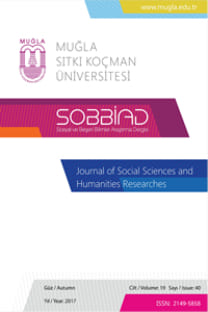ALTERNATİF BİR DEĞERLENDİRME SINAVI OLARAK BRANŞLA İLGİLİ SÖZLÜ SUNUM
Özet Makale üniversite düzeyinde İngilizce eğitimi veren bir okulda öğretim elemanlarının ortaklaşa çalışmaları sonucu okulda yapılan sözlü sınavlara alternatif olarak geliştirdikleri alan odaklı sözlü sunum üzerinedir. Öğrenciler İngilizce öğretmenliği dışındaki branşlarda eğitim gören ve İngilizce eğitimini bölüm zorunluluğu olarak almaktadırlar. Alan odaklı sözlü sunum projesi başlangıçta öğrencilerden gelen şikayetler üzerine geliştirilmiş olmasına rağmen, uygulama gerek öğretim elemanları ve gerekse öğrenciler açısından umut verici sonuçlar doğurmuştur. Uygulamaya katılan gönüllü yirmi öğrencinin katılımıyla yapılan yapılandırılmış görüşmeler sonucunda alan odaklı sözlü sunumların alternatif sözlü sınav anlamında etkin bir araç olduğu görülmüştür. Makale alan odaklı sözlü sunumların benzer eğitim kurumlarında uygulabilmesine imkan sağlayacak şekilde aşamalardan oluşan süreç hakkında okuyucuları bilgilendirmektedir.
Anahtar Kelimeler:
İngilizce Eğitimi, Sözlü Değerlendirme, Sözlü Sunum, Türk Öğrenciler
Discipline-related Oral Presentation as an Alternative Oral Assessment
This article reports on collaborative efforts of teachers in integrating discipline-relatedoral presentation as an alternative assessment into the curriculum of a tertiary levelEnglish language teaching school in Turkey. The students enrolled in the program arethose who major in a variety of disciplines other than ELT and receive Englishinstruction as a departmental requirement. Although discipline-related oral presentationproject was first initiated in response to the complaints raised by students about theprompt-based speaking assessment employed in the school, it was found that the projectyielded a number of promising results on the part of both students and teachers as well.The findings of the structured interviews with volunteer students revealed that the oralassessment through discipline-related oral presentations is an efficient tool. The articleprovides the readers with a step-by-step procedure employed in the project which can bereplicated in similar teaching contexts.
___
- Al-Issa. A.S and Al-Qubtan, R. 2010. ‘Taking the floor: Oral presentations in EFL classrooms’. TESOL Journal, 1/2: 227-246.
- Brown. H. D. 1994. Principles of language learning and teaching. Englewood Cliffs. NJ: Prentice Hall.
- Burns. A. & Joyce. H. 1997. Focus on Speaking. Sydney: NCETR.
- Gershon. S. 2008. Present Yourself 1 Experiences. Cambridge: Cambridge University Press.
- Glesne. C & Peshkin, A.(1992). Becoming a Qualitative Researcher: An introduction. NY: Longman.
- Harmer. J. (2007). The Practice of English Language Teaching. Essex: Pearson Education Limited .
- James. M. (2006). Teaching for transfer. ELT Journal, 60/3: 151-159
- King. J. (2002). Preparing EFL learners for oral presentations. The Internet TESL Journal, VIII:3 Available at http://iteslj.org/Lessons/King-Public Speaking.html. (accessed on 17 June 2012).
- Rahman. M. M. (2010). Teaching oral communication skills: A task-based approach. ESP World, 27/1: 123-129.
- Richards.J.C & Renandya. W. A.(2002). Methodology in Language Teaching. Cambridge: Cambridge University Press.
- Underhill. N. (2004). Testing Spoken Language a Handbook of Oral Testing Techniques. Cambridge: Cambridge University P
- ISSN: 2149-5858
- Yayın Aralığı: Yılda 2 Sayı
- Başlangıç: 2000
- Yayıncı: Mugla Sitki Kocman University
Sayıdaki Diğer Makaleler
KONAKLAMA İŞLETMELERİNDE NEPOTİZM VE ÖRGÜTSEL ADALET ALGISI ÜZERİNE BİR ARAŞTIRMA
Ebru ARSLANER, Günay EROL, Yasin BOYLU
ÖNLİSANS DÜZEYİNDE EĞİTİM ALAN AŞÇILIK PROGRAMI ÖĞRENCİLERİNİN MESLEKİ TUTUMLARININ BELİRLENMESİ
Alper KURNAZ, Hande AKYURT KURNAZ, Burhan KILIÇ
İSTATİSTİKSEL MÜHENDİSLİK ALGORİTMASININ ALTI SİGMA PROJELERİNDE KULLANILMASI ÜZERİNE BİR ARAŞTIRMA
İNSAN HAKLARININ NORMATİF KÖKENİ
LİSE ÖĞRENCİLERİNİN ELEŞTİREL DÜŞÜNME EĞİLİMLERİNİN ÇEŞİTLİ DEĞİŞKENLER AÇISINDAN İNCELENMESİ
Nicole Krauss’un Aşkın Tarihi Adlı Romanında Tarihi İzlekler
İlköğretim Öğrencilerinin Müzik Öğretim Metodlarını Algılamalarına İlişkin Kriterler
ALTERNATİF BİR DEĞERLENDİRME SINAVI OLARAK BRANŞLA İLGİLİ SÖZLÜ SUNUM
